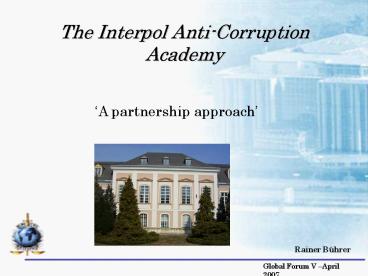The Interpol Anti-Corruption Academy - PowerPoint PPT Presentation
1 / 13
Title:
The Interpol Anti-Corruption Academy
Description:
Title: Slide 1 Author: RB Last modified by: RentNet Created Date: 2/25/2006 2:09:29 AM Document presentation format: On-screen Show Company: INTERPOL – PowerPoint PPT presentation
Number of Views:69
Avg rating:3.0/5.0
Title: The Interpol Anti-Corruption Academy
1
The Interpol Anti-Corruption Academy
A partnership approach
Rainer Bührer
2
Overview
- Interpol and Anti-Corruption the IGEC
- The Anti-Corruption Academy
- Basic concepts
- Status Quo
3
Part I - Interpol and Anti-Corruption the
Interpol Expert Group on Corruption (IGEC)
- Background
- IGEC is a multi disciplinary anti-corruption
expert group mandated by the Interpol General
Assembly in 1997 - It has been relatively effective within the law
enforcement community - by raising awareness, activating responses,
providing regional assistance, seminars
conferences, also regional based training and
facilitating operational assistance.
4
Shortcomings
- Insufficient training in terms of - Number of
courses/frequency of training - -
Duration of courses - Variance in skill
levels and,- Lack of follow-up. - 2. Lack of operational assistance support
5
UN Convention against Corruption
Opened for signature in Merida, Mexico, December
2003Ratified on December 14, 2005 Main
features for law enforcement Criminalization
Prevention Asset Recovery Extradition Inte
rnational and Law Enforcement Cooperation Joint
investigations and special investigative
techniques Training and technical
assistance Collection, exchange analysis of
Information
6
Part II - Interpols Anti-Corruption Academy
(IACA)
- Established a need for continuous, consistent
training - Global community was spending a fortune on
training, but law enforcement seldom a
recipient - UNCAC provided an international legal
framework, a mandate for LE
7
Part II - Interpols Anti-Corruption Academy
(IACA)
- Response
- Concept of an Academy proposed by the co-founder
of TI - Objective to professionalize anti-corruption
work - Concept tested in different fora,
- Austrian Government offered to host site in
Vienna, and to provide state of the art
facility - Unanimously approved by Interpol General
Assembly in September 2007
8
(No Transcript)
9
Part II - Interpols Anti-Corruption Academy
(IACA)
How will it differ from other Law Enforcement
Training Institutions?
- Develop original, baseline curricula focusing on
corruption and related subject matter - Recruit renowned academics, guest lecturers and
instructors with extensive practical
experience - Provide ongoing education ( CBT) for a growing
cadre of anti-corruption professionals - Seek accreditation with reputable colleges and
universities
10
Interpols Anti-Corruption Academy (IACA)
cont.
- Conduct dedicated research
- Develop international best practices and
standards, with regional deployment - Participate in standard-setting groups
- Collaborate with colleges and universities to
raise the profile of anti- corruption - Develop country specific investigative assistance
and information sharing.
11
Part III - Basic Concepts
- Not a police academy
- Not limited to Police Officers
- State of the Art facility
- Offer recognized educational qualifications
- Regional concept-using existing facilities
- Extensive Fundraising to enable Subsidies
- Partnership approach
- Work within UNCAC framework
12
Part IV Status Quowhere are we now
- Finalized the negotiations with the host country
- Formed an Academic Committee to design an
academic infrastructure and framework - Austrian Government will host a Founders
Conference - Engaged in multi-lateral and bi-lateral
negotiations with potential partners - Engaged in Fundraising activities
13
Thank you for your attention !
- My contact particulars
- Rainer Bührer
- Tel 33 4 72447323
- Fax 33 4 72447408
- E-mail r.buhrer_at_interpol.int































